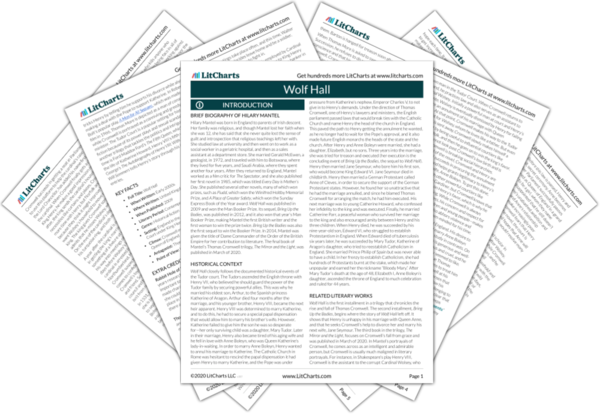Welcome to the LitCharts study guide on Hilary Mantel's Wolf Hall. Created by the original team behind SparkNotes, LitCharts are the world's best literature guides.
Wolf Hall: Introduction
Wolf Hall: Plot Summary
Wolf Hall: Detailed Summary & Analysis
Wolf Hall: Themes
Wolf Hall: Quotes
Wolf Hall: Characters
Wolf Hall: Symbols
Wolf Hall: Theme Wheel
Brief Biography of Hilary Mantel

Historical Context of Wolf Hall
Other Books Related to Wolf Hall
Key Facts about Wolf Hall
- Full Title: Wolf Hall
- When Written: Early 2000s
- Where Written: United Kingdom
- When Published: 2009
- Literary Period: Contemporary
- Genre: Historical fiction
- Setting: England in the 16th century, especially the Tudor Court under King Henry VIII
- Climax: Cromwell manages to get Anne Boleyn crowned as Queen of England
- Antagonist: Thomas More
- Point of View: Limited third-person, following Cromwell
Extra Credit for Wolf Hall
Rabbit Hole of Research. Mantel has said that she spent five years researching historical material for Wolf Hall since it was important to her that she get the political details right. She also made character cards that stated their names and locations so she could be sure that when she put a character in a certain place in the novel, history agreed that he or she was actually there at that time.
Thomas Cromwell the Cipher. While Thomas Cromwell’s laws and public life are historically documented, his personal life is a mystery. This allowed Mantel the liberty to imagine him so richly and to make his personal life fascinatingly complex. Mantel has called Cromwell “a nightmare for biographers and a gift for novelists.”







